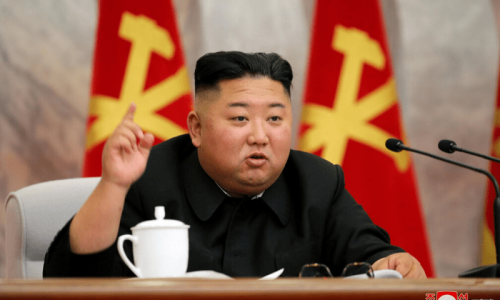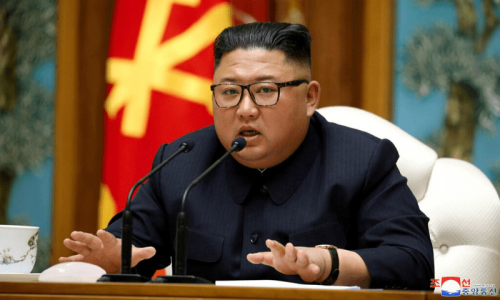North Korean leader Kim Jong Un wrapped up the year with fresh threats of a nuclear attack on Seoul and orders for a military arsenal build-up to prepare for a war that can “break out any time” on the peninsula, state media reported on Sunday.
Kim lambasted the United States during a lengthy speech at the end of five days of year-end party meetings that set his country’s military, political and economic policy decisions for 2024.
The meeting announced plans for further military development in the coming year, including launching three more spy satellites, building unmanned drones and developing electronic warfare capabilities, as well as strengthening nuclear and missile forces, according to the official Korean Central News Agency (KCNA).
This year, Pyongyang successfully launched a reconnaissance satellite, enshrined its status as a nuclear power in its constitution and test-fired the most advanced intercontinental ballistic missile (ICBM) in its arsenal.
Kim accused the United States of posing “various forms of military threat” and ordered his armed forces to maintain the “overwhelming war response capability”, according to KCNA’s account of the meeting that ended on Saturday.
The meeting concluded that it is a “fait accompli that a war may break out on the Korean peninsula any time due to the enemies’ reckless moves for invading the DPRK”, KCNA said, using the acronym of the North’s official name.
In an effort to deter Pyongyang, Washington deployed a nuclear-powered submarine in the South Korean port city of Busan this month and flew its long-range bombers in drills with Seoul and Tokyo.
The North has described the deployment of Washington’s strategic weapons, such as B-52 bombers, in joint drills on the Korean peninsula as “intentional nuclear war provocative moves”.
The military “should rapidly respond to any possible nuclear crisis and put continuous spurs to the preparations for a great event to suppress the whole territory of south Korea by mobilising all physical means and forces including nuclear forces in contingency”, Kim said.
‘Uncontrollable crisis’
Kim told the meeting he would no longer seek reconciliation and reunification with South Korea, noting the “uncontrollable crisis” that he said was triggered by Seoul and Washington.
Inter-Korean relations have deteriorated to a low point this year, with Pyongyang’s spy satellite launch prompting Seoul to partially suspend a 2018 military agreement aimed at defusing tensions.
Kim said it would be a mistake to regard South Korea “who publicly defined us as the ‘principal enemy’ […] as the partner of reconciliation and reunification”, according to KCNA.
Kim also ordered the drawing-up of measures for reorganising departments handling cross-border affairs to “fundamentally change the principle”.
Leif Easley, a professor of international relations at Ewha University in Seoul, said the emphasis on North Korea’s “significant military capabilities” was likely aimed at hiding its poor economic achievements this year.
“Much of what state-controlled media publishes is recycled propaganda,” he said, adding “Pyongyang’s bellicose rhetoric suggests its military moves are not only about deterrence but also domestic politics and international coercion.”
Pyongyang declared itself an “irreversible” nuclear power in 2022 and has repeatedly said it will never give up its nuclear weapons programme, which the regime views as essential for its survival.
The United Nations Security Council has adopted many resolutions calling on North Korea to halt its nuclear and ballistic missile programmes since Pyongyang first conducted a nuclear test in 2006.















































Dear visitor, the comments section is undergoing an overhaul and will return soon.